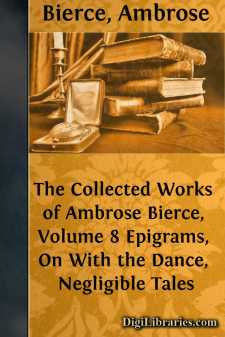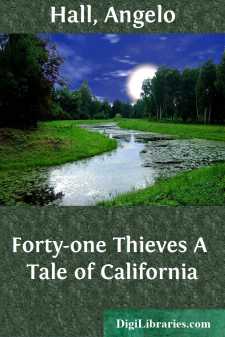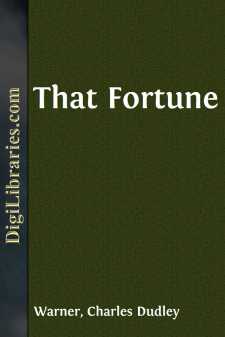Literary Collections
- American
- Ancient, Classical & Medieval 14
- Asian 1
- Australian & Oceanian 1
- Canadian 55
- Continental European 121
- English, Irish, Scottish, Welsh 179
- Essays 160
- General 24
- Letters 46
- Middle Eastern 1
American Books
Sort by:
by:
Margaret Ashmun
A DAY AT LAGUERRE'S F. HOPKINSON SMITH It is the most delightful of French inns, in the quaintest of French settlements. As you rush by in one of the innumerable trains that pass it daily, you may catch glimpses of tall trees trailing their branches in the still stream,—hardly a dozen yards wide,—of flocks of white ducks paddling together, and of queer punts drawn up on the shelving shore or...
more...
CHAPTER I. THE rain had poured in torrents all day, and now, for the third time since morning, I came home, wet, uncomfortable and weary. I half dreaded to look at the slate, lest some urgent call should stare me in the face. "It must indeed be a case of life and death, that takes me out again to-night," said I, as my good wife met me in the entry, and with light hands, made active by love,...
more...
As the name of our city grew to be more and more a byword for sudden and fabulous wealth, not only were the Huns and the Slavs, the Czechs and the Greeks drawn to us, but it became the fashion for distinguished Englishmen and Frenchmen and sometimes Germans and Italians to pay us a visit when they made the grand tour of America. They had been told that they must not miss us; scarcely a week went by in...
more...
by:
Ambrose Bierce
My name is John Brenwalter. My father, a drunkard, had a patent for an invention, for making coffee-berries out of clay; but he was an honest man and would not himself engage in the manufacture. He was, therefore, only moderately wealthy, his royalties from his really valuable invention bringing him hardly enough to pay his expenses of litigation with rogues guilty of infringement. So I lacked many...
more...
by:
Bret Harte
The rain had only ceased with the gray streaks of morning at Blazing Star, and the settlement awoke to a moral sense of cleanliness, and the finding of forgotten knives, tin cups, and smaller camp utensils, where the heavy showers had washed away the debris and dust heaps before the cabin doors. Indeed, it was recorded in Blazing Star that a fortunate early riser had once picked up on the highway a...
more...
by:
Angelo Hall
Dead Men Tell No Tales In the cemetery on the hill near the quiet village of Reedsville, Pennsylvania, you may find this inscription:WILLIAM F. CUMMINSson of Col. William & Martha Cumminswho was killed by highwaymen nearNevada City, CaliforniaSeptember 1, 1879aged 45 yrs. and 8 monthsBe ye therefore also readyFor the Son of Man comethAt an hour when ye think not. It is a beautiful spot, on the road...
more...
CHAPTER I. "THERE is a book of record in your mind, Edwin," said an old man to his young friend, "a book of record, in which every act of your life is noted down. Each morning a blank page is turned, on which the day's history is written in lines that cannot be effaced. This book of record is your memory; and, according to what it bears, will your future life be happy or miserable. An...
more...
On a summer day, long gone among the summer days that come but to go, a lad of twelve years was idly and recklessly swinging in the top of a tall hickory, the advance picket of a mountain forest. The tree was on the edge of a steep declivity of rocky pasture-land that fell rapidly down to the stately chestnuts, to the orchard, to the cornfields in the narrow valley, and the maples on the bank of the...
more...
Have you seen the magnificent slope of our beloved Tamalpais, as it curves from the changing colour of the bay, till touching the fleecy fog rolling in from the Pacific, it passes from day to rest? If you have not, I hope you may, for the sooner you have this glorious picture on your memory's walls, the brighter will be your future, and you will have a bit of beauty which need not be forgotten...
more...
by:
Bret Harte
I first knew her as the Queen of the Pirate Isle. To the best of my recollection she had no reasonable right to that title. She was only nine years old, inclined to plumpness and good humor, deprecated violence, and had never been to sea. Need it be added that she did NOT live in an island and that her name was Polly? Perhaps I ought to explain that she had already known other experiences of a purely...
more...











